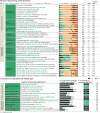Patient Acceptance of Prescribed and Fully Reimbursed mHealth Apps in Germany: An UTAUT2-based Online Survey Study
- PMID: 36705853
- PMCID: PMC9880914
- DOI: 10.1007/s10916-023-01910-x
Patient Acceptance of Prescribed and Fully Reimbursed mHealth Apps in Germany: An UTAUT2-based Online Survey Study
Abstract
The study aims to (1) investigate current levels of patient acceptance of mHealth in Germany; (2) determine the influencing factors of patients' intention to use, and (3) test the influence of prescription and reimbursement status on patient acceptance. Online survey with 1349 participants, of which 1051 were complete and included for statistical analysis, from a broad cross-section of the German population, addressing both users of mobile health (mHealth) applications and people without prior experience. SEM modeling based on a combination of two theoretical frameworks: the extended Unified Theory of Acceptance and Use of Technology and Health Protective Behavior Theories were used to assess acceptance. Users of mHealth in Germany are mostly patients between the ages of 30 - 50 with mental health or endocrine conditions. General willingness to use mHealth apps / DiGAs (mHealth apps fully reimbursed by social health insurance) is high at 76%, especially if they are governmentally certified, however only 27% of respondents were willing to pay out of pocket. With the exception of a spike in performance expectancy and data security, DiGAs lack a clear differentiation from mHealth apps. Perceived self-efficacy and performance expectancy are significant predictors of willingness to use digital health interventions; with age, attitude, and e-literacy being key demographic predictors. A key takeaway for regulators, providers of mHealth apps/ DiGAs, and other stakeholders involved in mHealth adoption is the importance of addressing negative beliefs early on, targeted communication around effortless usage of mHealth services across age groups and demographics, and focus on highlighting expected benefits of mHealth app/ DiGA usage.
Keywords: Digital health; Mobile health; Technology acceptance; UTAUT2; mHealth.
© 2023. The Author(s).
Conflict of interest statement
The author(s) declared no potential conflicts of interest with respect to the research, authorship, and/ or or publication of this article.
Figures






Similar articles
-
Applying an Extended UTAUT2 Model to Explain User Acceptance of Lifestyle and Therapy Mobile Health Apps: Survey Study.JMIR Mhealth Uhealth. 2022 Jan 18;10(1):e27095. doi: 10.2196/27095. JMIR Mhealth Uhealth. 2022. PMID: 35040801 Free PMC article.
-
Comparing the Acceptance of Mobile Hypertension Apps for Disease Management Among Patients Versus Clinical Use Among Physicians: Cross-sectional Survey.JMIR Cardio. 2022 Jan 6;6(1):e31617. doi: 10.2196/31617. JMIR Cardio. 2022. PMID: 34989683 Free PMC article.
-
Factors affecting physicians using mobile health applications: an empirical study.BMC Health Serv Res. 2022 Jan 4;22(1):24. doi: 10.1186/s12913-021-07339-7. BMC Health Serv Res. 2022. PMID: 34983501 Free PMC article.
-
Proposing a mobile apps acceptance model for users in the health area: A systematic literature review and meta-analysis.Health Informatics J. 2021 Jan-Mar;27(1):1460458220976737. doi: 10.1177/1460458220976737. Health Informatics J. 2021. PMID: 33438494
-
The multi-faceted usage patterns of nutrition apps: a survey on the appropriation of nutrition apps among German-speaking users of MyFitnessPal.BMC Med Inform Decis Mak. 2020 Oct 28;20(1):279. doi: 10.1186/s12911-020-01294-9. BMC Med Inform Decis Mak. 2020. PMID: 33115444 Free PMC article.
Cited by
-
Rating analysis and BERTopic modeling of consumer versus regulated mHealth app reviews in Germany.NPJ Digit Med. 2023 Jun 21;6(1):115. doi: 10.1038/s41746-023-00862-3. NPJ Digit Med. 2023. PMID: 37344556 Free PMC article.
-
[Telemedical Interventions in Ambulant Psychotherapeutic Practices: Online Survey of Psychotherapists and Patients in Germany on the use of Digital Interventions in Psychotherapy].Psychiatr Prax. 2025 Jan;52(1):8-16. doi: 10.1055/a-2415-8817. Epub 2024 Oct 9. Psychiatr Prax. 2025. PMID: 39384317 Free PMC article. German.
-
Acceptance and utilization of web-based self-help for caregivers of children with externalizing disorders.Child Adolesc Psychiatry Ment Health. 2024 Mar 25;18(1):40. doi: 10.1186/s13034-024-00724-0. Child Adolesc Psychiatry Ment Health. 2024. PMID: 38528607 Free PMC article.
-
Digital Health Literacy and Attitudes Toward eHealth Technologies Among Patients With Cardiovascular Disease and Their Implications for Secondary Prevention: Survey Study.JMIR Form Res. 2025 Mar 19;9:e63057. doi: 10.2196/63057. JMIR Form Res. 2025. PMID: 40106277 Free PMC article.
-
Assessing Patient Use of and Attitudes toward eHealth Services for Communication with Primary Care Centers in Saudi Arabia and Factors Affecting Usage.Healthcare (Basel). 2024 Sep 26;12(19):1929. doi: 10.3390/healthcare12191929. Healthcare (Basel). 2024. PMID: 39408109 Free PMC article.
References
-
- C. Ernsting et al., “Using Smartphones and Health Apps to Change and Manage Health Behaviors: A Population-Based Survey,” J Med Internet Res 2017;19(4):e101 https://www.jmir.org/2017/4/e101, vol. 19, no. 4, p. e6838, Apr. 2017, 10.2196/JMIR.6838. - PMC - PubMed
MeSH terms
LinkOut - more resources
Full Text Sources
Medical

